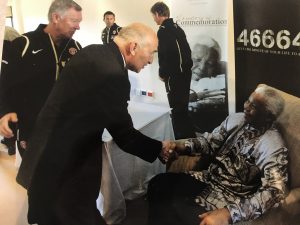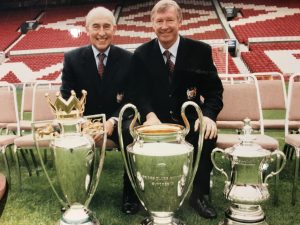Former Manchester United power broker still scoring as head of sport at Brabners

He was the man who navigated Manchester United through the legal and media maelstrom following Eric Cantona’s infamous kung-fu kick on a Crystal Palace fan in 1995.
Maurice Watkins, now senior partner and head of sport at Manchester law firm Brabners, also masterminded the deal which resulted from the then Red Devils’ manager Sir Alex Ferguson, who had said he would quit in 2002, changing his mind and carrying on.
A deal had almost been signed to replace him – reportedly with England manager Sven Goran Eriksson, although no-one including Watkins has ever officially confirmed this – but an urgent phone call to Watkins from Sir Alex sent the whole process into reverse.
In short, every significant deal at the football club since 1976 when he first became involved until he stepped down from the board in 2012, including manager hiring and firings and big transfers, have involved the genial law man.

Maurice Watkins shakes the hand of Nelson Mandela with Sir Alex Ferguson in the background
Once dubbed for his diplomatic skills as the ‘Henry Kissinger of Old Trafford’ – after the former US Secretary of State and Nobel Peace Prize winner – Watkins’ gigantic standing and influence extends far beyond the legal and sporting sectors where he is most known.
Awarded the CBE in 2011 for his charity work, including as chair of the Manchester University Hospitals Foundation Trust fundraising board, which raised £20m over a three year period for the New Children’s Hospital, Watkins is also chair of the Manchester Grammar School board of governors, chair of New Islington Free School in Manchester and a member of Bradford University Council.
He recently stepped down as chairman of Barnsley Football Club, but his involvement outside Brabners is not restricted to football organisations.
During a 12-year period as a director, he was interim chairman of the Rugby Football League in 2012, a year in which he carried out a governance review of the organisation; chairman of The Greyhound Board of Great Britain from 2009 to 2014; is a current director of Lancashire County Cricket Club; chairman of British Swimming; chairman of the Rugby League European Federation; President of the British Association for Sport and Law; a member of the British Olympic Association National Olympic Committee; chairman of LEN (European Swimming) Legal Committee; and a trustee of the Professional Footballers Pension Scheme.
Inside football he was a director of Manchester United from 1984 to 2012, and of its PLC affiliated company from 1991 to 2004 as well as company secretary of MUTV from 1996 to 2007.
His experience has helped Brabners become one of the most internationally renown sports law specialists even though it has only three offices – in Manchester, Liverpool and Preston.
Watkins’ expertise was meanwhile instrumental in Brabners being appointed to the Scottish Professional Football League’s (SPFL) new panel of external legal advisers recently.
The panel was created following the end of a long-term relationship between SPFL and Scotland-based Harper Mcleod LLP.
But that’s not where the specialism ends, as Watkins explains: “Where we’ve strengthened things is also in relation to other sports.
“Because sport is a massive area now. Football is the world game, but it’s also important you know what’s going on in other areas.
“There’s rugby and cricket, you’ve got also the Olympic sports and the work aspects that flow from that – employment, sponsorship, tax, community work, charity – we’re very strong with. All these subjects appear within a sporting context.
“Safeguarding is now a massive subject in sport, also governance. There’s a new UK Sport and Sport England governance code. A lot of sports are now being required to comply with its terms and very quickly because they’re getting some funding from those organisations.”
Watkins never set out on a deliberate path specifically to become a sports lawyer and was enjoying involvement in property and commercial deals while working for his prior company, James Chapman & Co, which were representing United, when as a result of tragic circumstances, he got involved.
“Sadly, the senior partner died at a Law Society meeting and there was a job to do the following day and somebody came round to my house to tell me the sad news, gave me a file and asked me to go down to Old Trafford in the morning to attend a meeting.

The treble year of 1999 – Mauric Watkins with Sir Alex Ferguson and the three trophies
“That’s going back to 1976. And it was from there that my involvement with United started and continued for many years. It was a bit of a fluke.”
Since those early days, sports law has become a major area of law, a separate legal discipline.
Watkins went on: “The thing about sports related work is that you’re never quite certain what’s going to happen on a day-to-day basis.
“Obviously, there’s a certain high-profile side to it. But like a lot of other things, confidentiality applies and no-one knows what you’ve been doing.
“But if publicity does come along, things very quickly move from the back pages to the middle and then the front pages.”
Ironically, although Watkins was always a Manchester United supporter, having been taken to matches as a youngster by his uncle, he missed out on the Charlton, Best and Law years because he played football himself (fullback or centre-half) for Old Mancunians in the Lancashire Amateur League until well into his 40s.
Watkins says with some pride he went from being secretary of Old Mancunians to the Manchester United board within 24 hours in the 1980s.
Regardless of his more well-known activities as a Manchester United power broker, Watkins’ proudest achievements include the work he’s done for the hospitals and fundraising to create the bursaries for boys at his old school Manchester Grammar.
“It enables us to provide 200 bursaries for able boys at any one time for parents who can’t afford to send their children there,” he said.
And he went on: “I’ve always been pleased to be a solicitor. I’ve had an advantage in that I’ve always done a certain amount of things outside the office environment.
“It’s enabled me to do lots of other things. Although there might be some additional pressures, when you turn your attention to things that aren’t directly related to what’s going on in the office, it does help to have variety.
“Whether I would still be working as a lawyer if I hadn’t done the other things is probably unlikely.”
And there is no sign of the aged 70-plus Watkins giving up yet.
He added: “Who wants to retire? I’m not sure what I’d do if I wasn’t working.”








